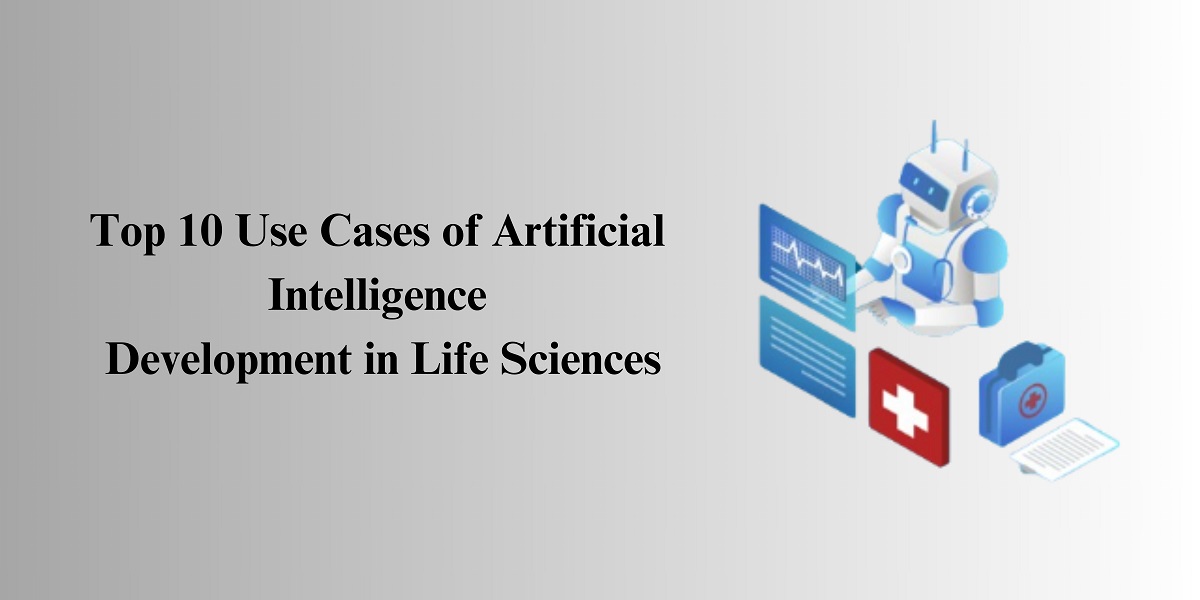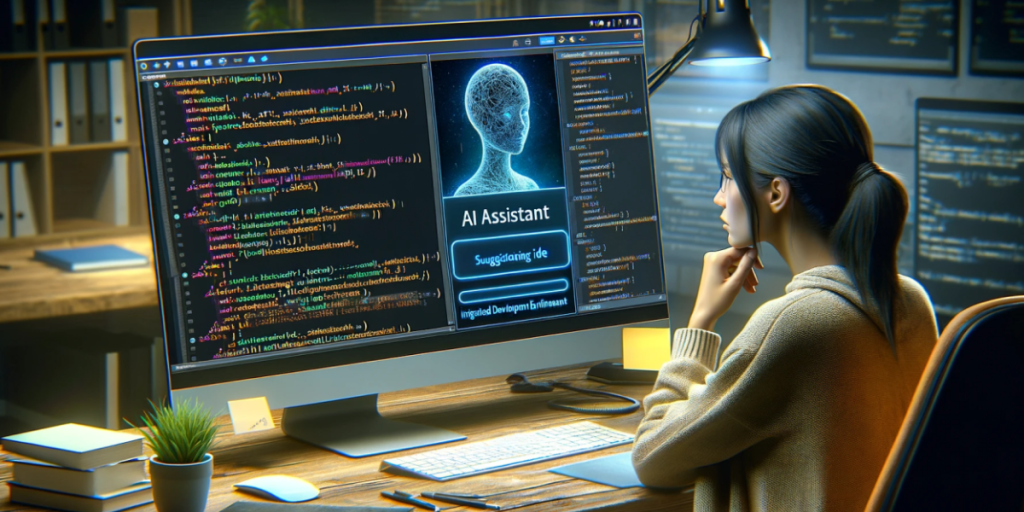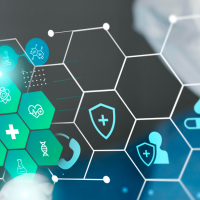The life sciences industry encompasses several companies creating products to promote or restore human health and well-being. Technological developments and Artificial Intelligence Development Companies are revolutionizing this sector.
Technology advancements mean that the pharmaceutical industry uses AI (AI) to change the development of drugs and patient care processes. AI is utilized in many ways. Ranging from increasing the speed and accuracy of diagnosis using medical imaging to identifying potential drug candidates. As well as optimizing the design of clinical trials.
AI has been a game changer in life sciences over the last few years. Through machine-learning algorithms and predictive analytics, scientists and healthcare professionals are gaining insights into complex biological systems that used to be impossible to obtain. This has resulted in more specific therapies, faster diagnosis of disease. Also, a better understanding of the mechanisms behind various ailments. Specific AI methods may even produce theories to test using conventional methods. As interest in this area expands, research is conducted by AI Consulting Firms to determine the specific situations.
How Can AI Transform the Life Sciences Value Chain?
The life sciences sector constantly explores new methods to enhance efficiency, safety, and costs. Research costs are increasing, and the general public pressures them to invent. Life sciences companies are turning to Artificial Intelligence (AI) for advancements in these areas.
In this article, we will identify the ten most popular ways that AI Development Company and artificial intelligence is helping advance the field of life sciences and the companies that are successfully using it.
Drug Discovery
It is essential to discover new drugs as it permits us to create new medicines and treatments that enhance and save the lives of those suffering from various ailments and illnesses. AI can aid in identifying potential drug candidates and predicting their safety and efficacy. Compared to conventional discovery methods, this method is more efficient and allows companies to introduce drugs faster and cost-effectively. This requires using AI algorithms to study massive amounts of data to determine compounds that can potentially develop into drugs. This may involve screening databases of compounds that are already in use or natural substances in addition to employing AI to develop and synthesize novel compounds.
Insilico Medicine has achieved notable success in drug discovery, finding possibilities for treatments for cancer and age-related illnesses. In the past, the company received an FDA’s initial Orphan Drug Designation for a drug developed and discovered by using AI. This s the treatment of a small molecule for Idiopathic pulmonary Fibrosis (IPF).
Clinical Trials
Finding the right people to conduct a clinical trial may be difficult. Monitoring responses to treatment and any possible side effects can be costly and time-consuming. AI Development Company states that AI will help you identify the populations of patients. This will be beneficial from the new drug, track their progress in real time, and identify adverse events and other concerns that could impact the results of trials.
Pfizer, one of the largest pharmaceutical companies, is using Artificial Intelligence (AI) to improve clinical trials. Through algorithmic machine learning, Pfizer aims to identify the best patient population for clinical trials and track the patient’s health during the trial.
Medical Device Design
Making efficient Medical devices can be a complicated and demanding procedure that requires careful consideration of many elements, including materials shapes, sizes, and shapes. The traditional approach involved lots of experimentation and trial, which resulted in a lengthy and expensive design cycle. However, AI can help to tackle these issues by enhancing and designing medical devices. With ML techniques, AI can analyze large quantities of data to pinpoint the most efficient materials dimensions, shapes. And also form for a particular device, allowing developers to make better-informed choices.
AI Consulting Services can assist in creating virtual prototypes for medical devices. Designers can evaluate and improve designs in a virtual environment and reducing the time and cost of creating physical prototypes. Through the use of AI to improve the product’s design, companies can speed up the process of developing medical devices, reduce costs, and bring more efficient products to market quicker.
The Johnson & Johnson Center for Device Innovation, located in Houston, is a pioneer in developing medical devices that use AI to improve patient outcomes.
Automating Pharmacovigilance Process
AI helps detect side effects by analyzing various patient information and enhancing safety in global drug trials. AI uses advanced technologies such as NLP and computer vision to detect potential adverse effects quickly.
If any negative side effects are discovered, an alert is sent to the drug development team. Responding promptly can help prevent health issues and save money.
Drug Design
The process involves designing or improving new medicines to enhance their therapeutic effects. This may include using AI to determine the 3D shape of the targeted molecular and to design a compound that will be compatible with it, in addition to forecasting how the molecule will behave within the human body.
Schrodinger is an organization that uses AI to accelerate the discovery of new drugs. It uses physics-based techniques and machine-learning methods to analyze and improve chemical compounds before creating them. This assists biotech companies, pharmaceutical companies, and academic researchers in creating new medicines faster and at a lower cost.
Personalised Medicine
Traditional medications are typically created to treat a broad spectrum of patients with similar symptoms. Personalized treatment is based on each person’s unique genetics and traits. Consider the unique differences in the environment, genes, and way of life. AI Consulting Firms can extract insights using biomarkers, genetic information, and other physiological data to create treatment plans specific to particular patients by predicting how they will react to various treatments. This can aid in avoiding adverse reactions, limit the necessity of costly or unneeded treatments on patients who are not likely to react, and cut down on hospitalization and outpatient costs.
Deep Genomics is a company using AI to analyze genomic data and create precision treatments for genetic disorders. AI is ideally suited to this type of job because it can quickly and precisely analyze huge data sets to discover patterns and relationships that are difficult for human beings to discern. Deep Genomics CEO Brenden Frey recently claimed, “We have built a system that within two hours can scan over 200,000 pathogenic patient mutations and automatically identify potential drug targets.”
Drug Repurposing
Drug repurposing is finding new uses for existing medications initially developed to treat various medical ailments. This can reduce the time and cost of drug development and also provide efficient treatments to patients quickly. AI will help discover existing medications that could be effective in treating different ailments or diseases. This method involves applying machine learning algorithms to study the chemical structure and properties of drugs and then comparing them to data regarding biological pathways and diseases.
London-based BenevolentAI is a prime example of a company that uses AI to discover new ways to use existing drugs. GlobalData informs that BenevolentAI has identified numerous potential drug candidates that can be reused for COVID-19 and Parkinson’s disease.
Biomarker Identification
Identifying biomarkers is identifying measurable biomarkers that can aid in diagnosing and predicting the outcome of a condition or treatment in medical. AI helps to detect biomarkers by analyzing medical and biological data from patients and identifying patterns and connections that might be difficult for human beings to discern. The neural networks can be taught using the data to identify certain biomarkers related to a specific disease or condition. This information can be used to design more precise diagnostic tests or personalized treatments.
Foundation Medicine is a company that uses advanced genomic testing techniques to analyze the DNA of cancer patients. To identify biomarkers, they may use to tailor treatment strategies. They use machine learning and artificial intelligence to study vast amounts of genomic information from tumor samples, looking to find patterns or correlations that may aid in predicting the response to treatment and progression of disease. By identifying these biomarkers, Foundation Medicine is working towards improving cancer treatment outcomes by developing more targeted and efficient treatments specifically tailored to each patient.
Chatbots and Virtual Assistants
AI Development Company creates AI-powered chatbots having variety of applications for companies in the life sciences. These include providing customer service in streamlining the recruitment process to conduct clinical studies, acting as virtual assistants to medical professionals, producing leads, offering personalized product recommendations, and also helping with the analysis of data to aid in making business decisions. Chatbots can increase customer satisfaction and engagement, enhance efficiency, reduce costs, and provide valuable insights to improve the business’s overall performance.
Electronic Health Record (EHR) Analysis
Electronic Health Records (EHRs) comprise digital copies of the patient’s health record. This allows healthcare professionals to access the patient’s health data easily and allow patients to be more involved in their health care. AI aids in analyzing EHR information by employing algorithms to detect patterns. These might not immediately be apparent to human beings.
The insights gained can then be utilized to enhance patient care and outcomes by allowing healthcare professionals to make better-informed choices about treatment options and personalized treatment plans. They also help identify health risks that might be present before they become severe, allowing for early intervention and preventative treatment. In addition, companies like Flatiron Health use AI to study EHR data to determine which patients are suitable for clinical trials and to monitor the outcomes of patients.
Real-World Examples of AI Success in Life Sciences
The enormous possibility of AI to change the nature of industry is illustrated by actual examples. Some examples include:
- Rapidly advancing drug discovery for COVID-19
- IBM Watson’s clinical trial of matching
- Oculomics’ prediction of disease
- Clinical trials decentralized through Curebase and BEKHealth
By utilizing AI technology with the help of AI Consulting Services, the OSIC Data Repository provides practitioners with access to IPF information and diagnostic tools that improve the patient’s experience and outcomes. By processing and analyzing images and clinical data, healthcare professionals can provide more precise diagnoses. Also, individualized treatment plans that ultimately lead to better patient experiences and better health outcomes.
COVID-19 accelerates discovery of drugs
In the rapid discovery of drugs for COVID-19, AI has played an essential role in using machine learning algorithms to find potential targets for drugs and to analyze vast databases of medications for possible treatments. Researchers from Oxford University and IBM have created an innovative AI model capable of creating new molecules that block SARS-CoV-2, the virus responsible for COVID-19.
IBM Watson’s Clinical Trial for Matching
IBM Watson’s clinical trials match-making system uses AI technology to detect possible connections between clinical trials and patients. However it will be based on medical history and other relevant factors.
The AI-driven strategy by AI Development Company has led to an astounding 20% growth in breast cancer trial enrollment in just 11 months. Demonstrating AI’s ability to transform patient recruitment and speed up medical research.
Oculomics Disease Prediction
Oculomics utilizes imaging and AI to detect disease and determine biomarkers, like heart risk predictions. Using AI, economics analyzes data to determine the presence or probability of different eye conditions. AI-driven methods aid in the early detection of eye diseases and treatment of eye conditions. It also offers insight into the possibility of any other health problems.
Curebase, as well as BEKHealth’s Decentralized Clinical Trials
Curebase and BEKHealth team up to find potential trial participants among untapped patient populations and standardize the patient medical records by conducting decentralized clinical trials, ensuring trial results’ accuracy.
This collaboration aims to expand the availability of decentralized clinical trials and improve patients’ outcomes. Also it will expand experiences by utilizing BEKHealth’s AI-powered technology for matching patients.
Improved OSIC Data Repository Outcomes for Patients
OSIC Data Repository leverages AI technology to build an open-source medical image and data repository. It will give access to massive datasets of medical data and images to help develop new therapies and treatments that enhance the outcomes of patients.
The platform gives practitioners access to IPF diagnostic and data tools that demonstrate how AI can lead to healthcare transformation and improve patient care quality.
What is Next for AI in Life Sciences?
While Artificial Intelligence Development Company continue to develop and experiment, more innovative use scenarios for AI will likely be created. It will change how we conduct business and improving the patient experience in ways we are just beginning to grasp. This is a thrilling moment for life sciences, and AI will undoubtedly be a significant factor in shaping the future of the field. However, businesses in life sciences that do not adopt AI are at risk of being left behind by their competitors in terms of efficiency, creativity, and success.
Final Thoughts
AI is poised to revolutionize the field of life sciences by accelerating the development and discovery of drugs. This will result in enhanced clinical trials, and facilitating the personalization of medicine and precision healthcare.
Many instances of real-world AI performance in life sciences illustrate the vast possibilities of AI technology in improving patient outcomes, lowering expenses, and speeding up the diagnosis process and treatments.

























